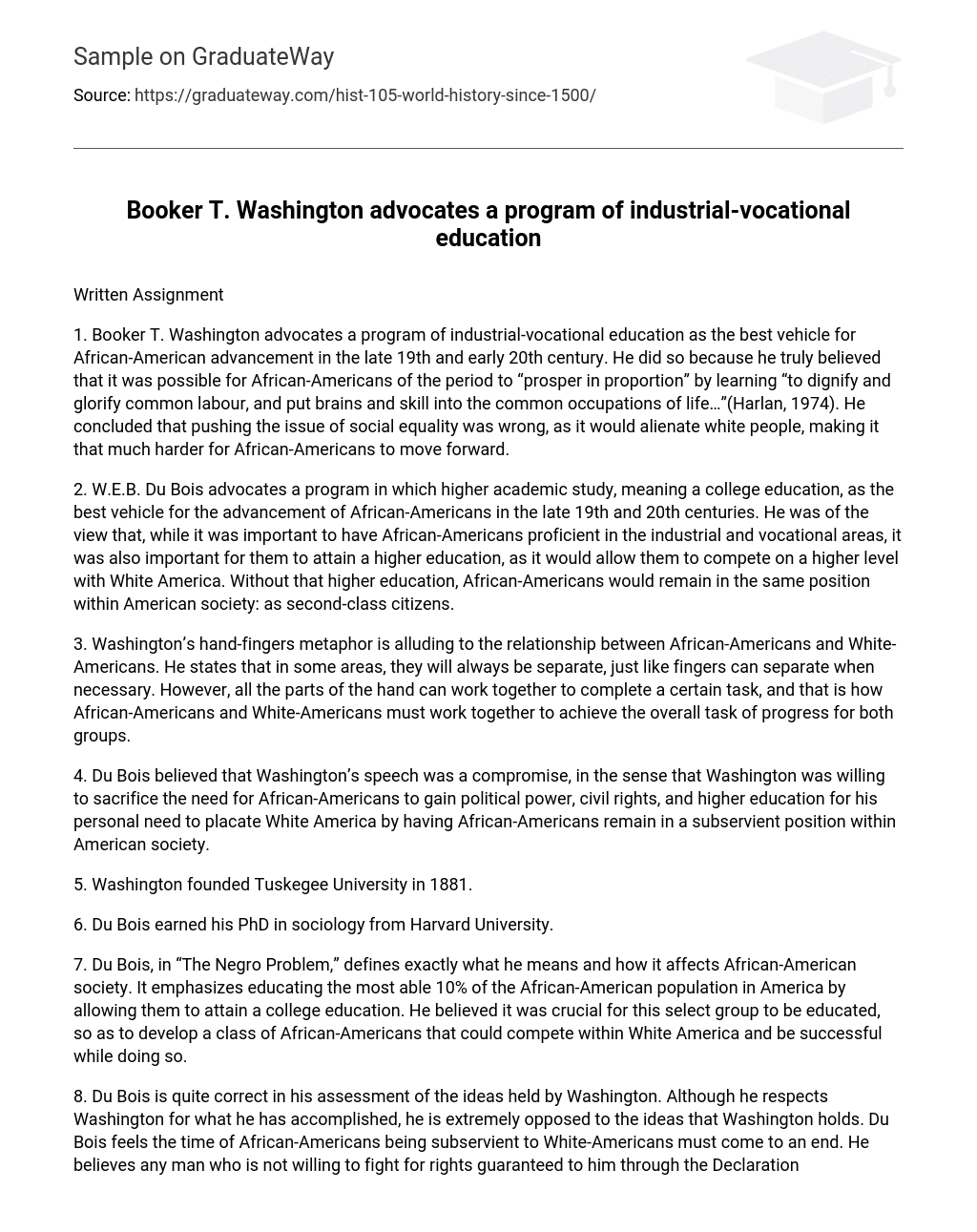Written Assignment
1. Booker T. Washington advocates a program of industrial-vocational education as the best vehicle for African-American advancement in the late 19th and early 20th century. He did so because he truly believed that it was possible for African-Americans of the period to “prosper in proportion” by learning “to dignify and glorify common labour, and put brains and skill into the common occupations of life…”(Harlan, 1974). He concluded that pushing the issue of social equality was wrong, as it would alienate white people, making it that much harder for African-Americans to move forward.
2. W.E.B. Du Bois advocates a program in which higher academic study, meaning a college education, as the best vehicle for the advancement of African-Americans in the late 19th and 20th centuries. He was of the view that, while it was important to have African-Americans proficient in the industrial and vocational areas, it was also important for them to attain a higher education, as it would allow them to compete on a higher level with White America. Without that higher education, African-Americans would remain in the same position within American society: as second-class citizens.
3. Washington’s hand-fingers metaphor is alluding to the relationship between African-Americans and White-Americans. He states that in some areas, they will always be separate, just like fingers can separate when necessary. However, all the parts of the hand can work together to complete a certain task, and that is how African-Americans and White-Americans must work together to achieve the overall task of progress for both groups.
4. Du Bois believed that Washington’s speech was a compromise, in the sense that Washington was willing to sacrifice the need for African-Americans to gain political power, civil rights, and higher education for his personal need to placate White America by having African-Americans remain in a subservient position within American society.
5. Washington founded Tuskegee University in 1881.
6. Du Bois earned his PhD in sociology from Harvard University.
7. Du Bois, in “The Negro Problem,” defines exactly what he means and how it affects African-American society. It emphasizes educating the most able 10% of the African-American population in America by allowing them to attain a college education. He believed it was crucial for this select group to be educated, so as to develop a class of African-Americans that could compete within White America and be successful while doing so.
8. Du Bois is quite correct in his assessment of the ideas held by Washington. Although he respects Washington for what he has accomplished, he is extremely opposed to the ideas that Washington holds. Du Bois feels the time of African-Americans being subservient to White-Americans must come to an end. He believes any man who is not willing to fight for rights guaranteed to him through the Declaration of Independence and U.S. Constitution is not a true man. Although Washington, in his response to Du Bois’ and others’ reaction to his ‘Atlanta Compromise’ speech, attempts to state that he is in favor of African-Americans gaining the rights long-denied to them, he immediately falls right back into the views he put forth in his speech. That alone is evidence that Du Bois was correct in his assessment of the speech.
9. Their upbringings played a definite role in their beliefs. Washington retained that subservient attitude that slaves had to maintain in order to survive daily life in the South. He may have been fortunate to have experiences of white people treating him with some degree of dignity, and this may be a contributing factor to his insistence that African-Americans work together with White-Americans rather than agitate for their rights. Du Bois, through living in the North and being part of a wealthy family, most likely had experiences that did not entail overt racism like that seen in the South. Yet, he would still be viewed as a second-class citizen simply because of his race. Therefore, because he knew he was of the same quality and caliber as whites, he was more adamant in securing the rights African-Americans had been denied, for he knew he was entitled to them.
10. One particular disadvantage was that both men were somewhat idealistic with regard to their ideas. They knew that their ideas could be combined, but made no attempts to do so. However, they both had an advantage in that the large following they had included some support from White America. In a way, both men were advocating education of some sort, and despite those White-Americans who felt African-Americans were not intelligent, there were many more who did believe that African-Americans were intelligent and worthy of expanding that intelligence. The fact that both men were advocating something productive for their race met with approval for some of White America.





